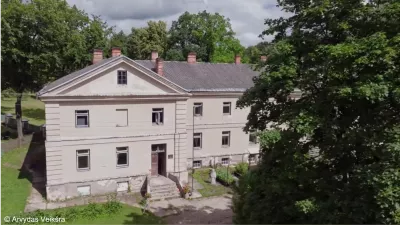General information
RDP Priority
- P6. Social inclusion and local development
RDP Focus Area
- 6B: Local development
RDP Measure
- M19: LEADER/CLLD
Summary
The 300-year-old Monastery of the Barefoot Carmelites in Antalieptė is a unique cultural heritage site in Lithuania. Abandoned for a long time, in 2016 the monastery was taken under the auspices of ‘Inovatorių slėnis’ (a support organisation to develop social innovation and social business). Since then, the conditions of the monastery have improved and visitor numbers have started to increase.
However, with the larger flow of visitors, a new challenge arose and facilities struggled to cope with the growing numbers, particularly the Monastery’s catering services. At the same time, the employment of socially vulnerable groups, particularly young people and their integration into the labour market, became an increasing problem in the country.
In 2020, the project partnership sought to find one solution for both challenges by working with socially excluded and disadvantaged people in project activities that were designed to improve the Monastery’s kitchen, catering areas, food production and menu choices.
Results
- A fully equipped kitchen and one furnished catering room created with a capacity of 40 visitors.
- A new two-hour educational-tasting programme created, called ‘The old meals and customs of the monks’.
- Involvement of socially excluded and disadvantaged people across all project activities.
- Two part-time jobs created (social worker and chef) and one full time job safeguarded.

Promoter
VšĮ Inovatorių slėnis
Funding
Total budget 27 264 (EUR)
EAFRD 19 426 (EUR)
National/Regional 6 475 (EUR)
Private/Own funds 1 363 (EUR)
Ressourcen
Documents
EU CAP Network - Good Practice - Lithuanian cultural heritage brought back to life with LEADER funds
(PDF – 520.56 KB)
Context
The 300-year-old Monastery of the Barefoot Carmelites in Antalieptė is a unique cultural heritage site in Lithuania. Abandoned for a long time, in 2016 the Monastery was taken under the auspices of ‘Inovatorių slėnis’ (a support organisation to develop social innovation and social business). Since then, the condition of the Monastery has improved and visitor numbers have started to increase.
However, with the larger flow of visitors a new challenge arose and facilities struggled to cope with the growing numbers, particularly the Monastery’s catering services. At the same time, the employment of socially vulnerable groups, particularly young people with a disability or who are being released from prison and their integration into the labour market, became an increasing problem in the country.
‘Inovatorių slėnis’ brought together partners to jointly solve these issues in an integrated manner. This included the Informal Education House, the Panevėžys branch of the Lithuanian Probation Service and the Zarasai social care home experienced in social and work skills development projects.
In response to both issues, the partners decided to design the project entitled ‘Renaissance of Antalieptė Monastery’ to help solve the problems of employment and integration of socially vulnerable groups into the labour market, while simultaneously meeting the needs of the growing numbers of visitors by expanding the range of services provided.
The project idea related well to the aims of the Local Development Strategy of the ‘Zarasai – Visaginas region’ LAG, focusing on promoting the socioeconomic development of rural areas and addressing youth employment issues.
Objectives
The overall aim of the LEADER project was to reduce poverty and social exclusion and to create improved conditions for the employment and integration of disadvantaged people by creating a social enterprise in Antalieptė Monastery.
The following objectives were pursued:
- To set up and equip the Monastery’s restaurant facilities including kitchen and dining room in line with the necessary hygiene standards.
- To improve the accessibility of the restaurant for people with disabilities.
- To develop new product lines by involving people experiencing social difficulties in the production process.
- To create an attractive educational programme.
The ambition was that, in all project activities, socially excluded and disadvantaged people would actively participate. In addition, a specific objective was set to ensure effective communication during project implementation between all project partners.
Activities
The project incorporated the following activities:
- Developing a business plan.
- Procuring and purchasing a dome dishwasher, gas stove, deep fryer, meat grinder, coffee machine and other equipment, an industrial washing machine with dryer and sets of tables and chairs to cater for 40 visitors.
- Refurbishing multiple aspects of the kitchen and catering facilities (at own costs).
- Developing an educational-tasting programme for visitors and a new product line based on home grown produce from the Monastery.
- Setting up an educational garden (with the help of volunteers).
Main results
The following results were obtained:
- A fully equipped, 18 m2 kitchen and one furnished catering room created with a capacity of 40 visitors.
- A new two-hour educational-tasting programme created, called ‘The old meals and customs of the monks’.
- A new product line created called ‘homemade’ (canned vegetables, jams, dried fruits, lemonade).
- Involvement of socially excluded and disadvantaged people across all project activities.
- Two part-time jobs created (social worker and chef) and one full time job safeguarded.
- The project assisted in addressing employment and labour market integration issues for socially vulnerable groups while increasing the Monastery’s capacities to benefit from the increasing visitor demand.
Key lessons and recommendations
- Planning, planning, planning! It is important to plan the budget in considerable detail so that there is enough money for the implementation of activities down to the last detail. If the budget is insufficient, then other sources of funding must be sought in parallel.
- The project should incorporate a budget for training purposes to build the relevant competencies of employees and project team members.
- Involving the representatives of the project partner organisation in the project activities, such as in culinary training, can inspire and generate new project ideas.
